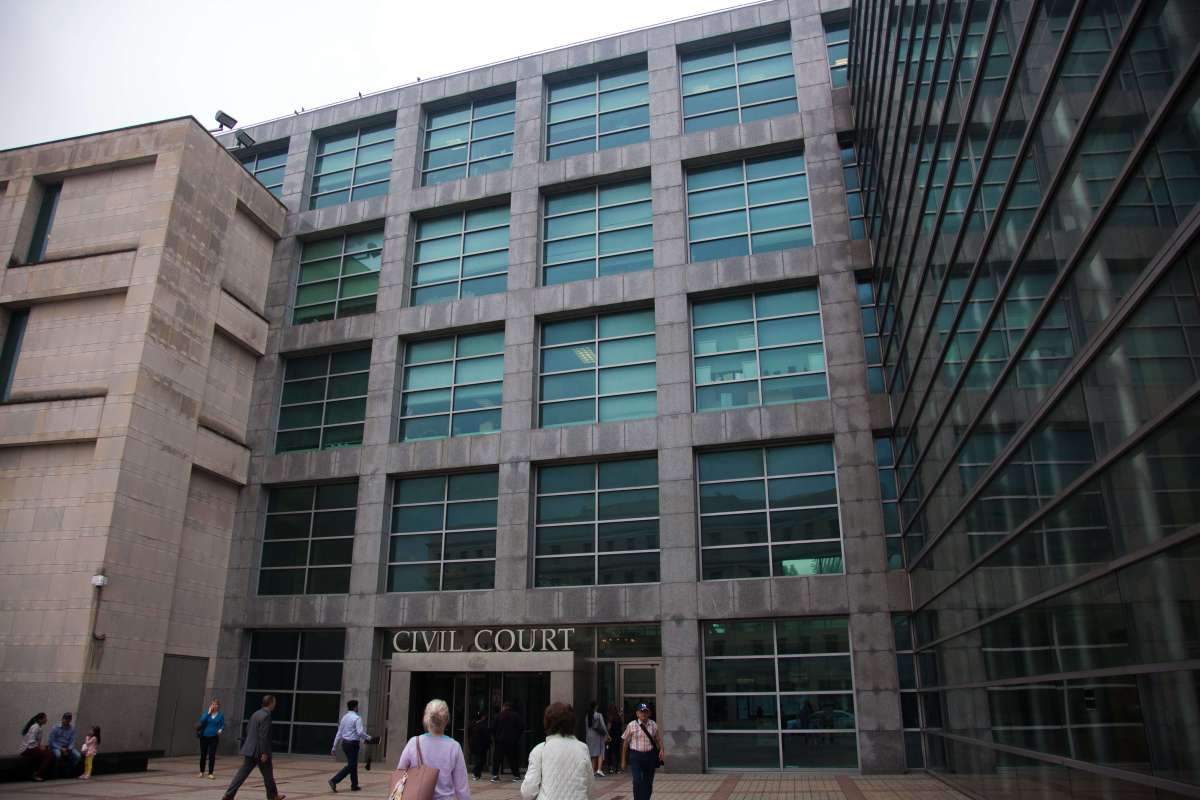Susan Vaca, an immigration advocate with QLA Outreach Center, came to Queens Civil Court in Jamaica on June 11 with a modest goal: to advise a non-English speaking client who was scheduled to meet with a clerk that morning to talk about a pending housing dispute.
Shortly after entering the court chamber, Vaca realized that her conscience was going make this task harder than she anticipated.
In helping her client, she noticed another non-English speaker who had no idea when to approach the clerk. Then another, and another. Before long, she was helping four Spanish-speaking clients navigate to their scheduled meeting.
Vaca said the main concern was helping direct clients around the chamber, but once they got to the appointment, she stuck around for their meetings because she was concerned the interpreter was not doing enough to make sure the clients understood her.
“There’s one interpreter [for the court chamber] and she doesn’t interpret every word. It seems like she doesn’t want to be there – maybe it’s a hard job,” Vaca said.
Vaca’s experience reflects a view shared by some lawyers, interpreters and immigration advocates that the interpretation services in Queens Housing Court are deficient. Since the state Legislature passed its historic set of tenant protection laws in June, their impact will now be determined by the court’s ability to enforce them. In Queens, equal access to these tenant protections hinges on interpretation services.
Lost in translation
Queens has the highest number of non-English speakers in the five boroughs, with 26 percent of its residents deemed by the census to have limited English proficiency.
While interpretation services play a key role in the Queens justice system, these services often leave non-English speakers confused about how to navigate the courts, confronted with unsolicited legal advice from their interpreters or reliant on independently contracted interpreters who have do not have a thorough understanding of the legal system themselves.
“Interpretation is subpar and interpreters are telling people in the hallway, ‘Just move out. You have no case, no defense.’ And we’re like, ‘You’re not a lawyer. Don’t tell people that,’ you know? But there’s no one else in the building who can understand what they’re saying. And so they have this weird power, and a lack of training,” said Sateesh Nori, attorney-in-charge of the Queens Neighborhood Office of The Legal Aid Society.
Outside the courtroom, where Vaca was scrambling to manage her impromptu clients, Norma Tomala was sitting with Claudia Bustos, a paralegal from the Legal Aid Society who was helping her with interpretation that day.
Tomala said that last time she met with a legal clerk in housing court, her husband was asking whether how they could get a security deposit back, but their interpreter that day brushed him off, and instead of translating his question, told him it wasn’t realistic.
Ethics and salary questions
A spokesperson for housing court said that interpreters are made aware of their ethical and professional responsibilities, which include not giving any legal advice, when they attend webinars on the subject of ethics. They are also provided with a Court Interpreter Manual containing this information.
Any concern regarding a breach in ethical responsibility can be reported to the Chief Clerk, said the spokesperson. But it does not take more than a brief visit to the fourth floor of Queens Civil Court, to hear reports that expose these ethical safeguards as ineffective.
“Some [interpreters] are more concerned with the case than others,” said Tomala.
Nori framed this disparity in terms of pay grade. “In the state court, interpreters are paid way less than the federal interpreters. So there’s a different caliber of person that takes on this work,” he said.
But even within the realm of state court interpreters, there is another level of stratification: contract and full-time.
Florie Ho, who worked on a per diem basis as a Chinese interpreter in housing court for Geneva Worldwide, a contractor that provides interpreters to agencies across the city, said that more and more the courts are using contractor services to fill the need, with less training and oversight.
A spokesperson for state court system said that per diem interpreters are required to attend an ethics seminar presented by the Office of Language Access (OLA). But Ho said that she never received this training at Geneva even though she translated city materials directly for OLA in addition to her work in civil court.
“Because the city lowered the quality that they require, pretty much anyone who was a native speaker could do it and you charge your own price,” Ho said.
She said that because Geneva’s staffing system is built off of a bidding process that pits the rates set by its contract workers against one another, interpreters are more likely to get consistent work with lower rates. As a result, experience and trainings have become disincentivized.
Ho said that she met some interpreters at Geneva who took rigorous court interpretation exams, which used to be a requirement to become a court interpreter. As independent contractors, these interpreters find the staffing system stops them from charging their worth.
“I think there’s a really high rate of turnover. Like most people would just use it to supplement something else. You can’t live off it at all,” Ho said.
Although a spokesperson for the court system says that no state court has used Geneva Worldwide “for well over a year,” Ho said that she interpreted in Brooklyn Civil Court for the company as recently as November.
QNS reached out to Geneva, which declined to comment on this story.
A stacked deck
The manner that interpreters are scheduled also creates issues for defendants. Nori said that because of the high amount of interpretation in Queens, the court ends up bunching the cases involving common languages together. That means when the court registers the need for an interpreter, it reschedules cases into full-day batches of nothing but Bengali, Chinese or Korean speakers, for instance.
When these cases get rescheduled, it can drag out the judicial process. “So first, you have to make arrangements for your kids or get an Access-a-Ride. Then you get to court, and the delay is held against you. When you sit down to negotiate, it’s like, ‘Well, you’re already three days late,’” said Nori.
When they finally do get there, it’s possible that they will be reliant on an interpreter hired on a contract basis. In Ho’s experience through Geneva, contractors hired under these circumstances learn about their caseload for the first time the day of, leaving no time for preparation.
“Interpreters need to know what’s going on or be given like a briefing. Because otherwise interpretation could be wrong solely because you yourself don’t know what’s going on. So it’s all just confused people,” said Ho. “I think the courts need to know whether or not they actually care about people understanding the judges and the lawyers and what’s going on.”




































